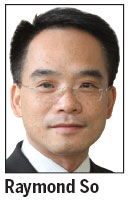Tung Chung's future hangs in balance between jobs and housing
Updated: 2013-07-18 05:36
By Raymond So(HK Edition)
|
|||||||||
The government originally planned to develop Tung Chung into a new town with a population of 280,000, up from around 80,000 currently. According to a consultancy report commissioned by the government, the development of Tung Chung is to be centered on the Tung Chung City, spreading to Tung Chung East and Tung Chung West.
Tung Chung East is to be built on reclaimed land. The government has two plans for the development. The first focuses on housing, which will accommodate 110,000 people and create 17,000 jobs. The second focuses on economic development: the number of people who live there will be 95,000, but the number of jobs will increase to 36,000. The difference in these two approaches concerns the number of people living there and the number of jobs created. If we prefer to house more people, we have to give up some land for economic development and hence fewer job opportunities. But if we prefer to create more jobs, land needs to be used for commercial activities and less can be utilized for housing. These two approaches let us see vividly the opportunity cost of economic development and housing. Though we favor both, we have to make a decision on how to allocate the land's use.
I would prefer greater economic opportunities. Tung Chung already has serious unemployment. Its residents complain about the lack of jobs. While the airport, Disneyland and the Asian World Expo offer job opportunities, there is a mismatch of skill sets, and these places are still far away from where people live. As a result, Tung Chung residents endure long commuting time to get to work in Lantau. Many even commute to the city to work. Time and travel cost have caused much discontent among residents. If the Tung Chung East development plan creates more jobs, at least Tung Chung residents can have a closer work place. These work places will also create a more balanced and dynamic commercial environment.

Like all development plans, there are differing views on how Tung Chung East is to be developed. Since the project involves land reclamation, there are concerns over its environmental impact. The government has performed an assessment to ensure the environment is not adversely affected. Since the idea is still nascent, there are not many strong opposition voices.
The Tung Chung West development, on the other hand, has attracted more diverse views. Unlike its proposed East counterpart, Tung Chung West exists already with many green belts and farm land, as well as some monasteries. When it comes to changing the current environment for development, opposition is strong. Some want to preserve its pastoral qualities while others suggest that development of farm land can increase the area's potential. In the government's development plans, Tung Chung West requires careful consideration in the planning process. Studies on the environment of Tung Chung West suggest that the area has an environment rich in flora and fauna. Hence, the government has been careful not to house many people there. The current plans target 45,000 people, which is substantially fewer than the new population of Tung Chung East. In short, the development of Tung Chung clearly has a bias towards Tung Chung East, with the aim of mixing both housing and economic needs.
The development process is still at consultation stages. From what we see today, the government has made substantial changes to its original plans after listening to public views. This shows that the government is willing to listen to and accommodate diverse views in the planning process.
This approach does not only look at planning from a professional view but also takes people's views into consideration. The general public may not have the expertise or professional knowledge to understand what professional town planning is, but we can no longer simply ignore public opinion and stick to the old ways of doing town planning based only on professional knowledge and views. Nowadays, we have to bear in mind that public opinions are equally important in the town-planning process. The current consultation clearly shows the government is willing to adopt ideas from the public. This is especially important in the Tung Chung West development, wherein special care and attention needs to be paid to concerns over the future of its monasteries. Big things all have a small beginning. If we want to develop Tung Chung correctly, details like the future of monasteries should not be overlooked.
The author is dean of the School of Business at Hang Seng Management College.
(HK Edition 07/18/2013 page1)